Running up the passage between the rock garden and the shore, I open the outboard’s throttle. Five horses give me all they've got. There are three buoys which delimit the boulder water. I cut inside the first one knowing that the shark fin boulder on my left is only a sentry. There’s still plenty of deep water before the real peril. Cutting right just a few yards from shore, I cruise through the shallow water. Someone watching from the far shore would think this run reckless, but they can’t see me in the fog.
I take this lane not because it’s better or faster. Going around the far side might cost me a minute or two. I take this run because I know it’s here. Bob showed it to me years ago before cancer took him. I think he took it for the same reason. There’s a thrill knowing a piece of tribal knowledge. You keep it secret. Keep it safe. There’s also a bit of a thrill when the kayakers see you coming and think you’re about to run aground.
The water lilies were on the pond late this year. The ice didn’t come off until late April and then a wet spring kept the water levels about a foot above normal. By mid-July, the height of Damselfly season, the water was still high and the weeds, prime ground for the damsel’s mating rituals, were sparse. They never did come in good and the damsel fishing suffered for it. Fortunately, poppers did well right through the stinky days of summer and into the cool evenings of early fall.
Bob was a recreational angler meaning that he didn’t appear to take it too seriously. He always had a rod in the boat but I can only recall fishing with him once. I suspect, like most anglers, he was out for something other than the angling. As we eased back and forth among each island’s channels or along the edges of a weed bed he’d point out the good spots for largemouth. As a young trout angler, I didn’t appreciate these tips as much as I should have. I fished the pond at the shoulders of the season when I knew I could get the brook trout that otherwise lived deep. But as my angling obsession has grown, so has the diversity of species that I’m willing to chase. In fact, if it swims, it's more or less fair game.
On a kayak you have more freedom to explore the topography of a pond than a motorboat. The rock garden is no longer a menace though I still can’t shake a shiver when I see the first boulder emerge from the gloom and glide beneath me. Maybe it’s the chill of the early morning air. Likely, its something that haunts the deeper folds of my brain. There’s darkness. There’s danger. But there’s a reason I’m cruising in places that my caveman brain fears. The opportunity is too good to pass up.
Most of the pond’s largemouth are small and cruise the shallows nipping at anything foolish enough to look edible. Most of them won’t grow large. Their stunted situation isn’t the fault of predation or even angling pressure, it’s the results of weather patterns and geology.
During the 1970s, US industry put over 30,000 tons of Sulphur Dioxide into the air each year. The weather patterns from the industrial centers of the mid-west moved SO2 laden clouds north and east racing through New England on their way to the North Atlantic. The pond is nestled along a mountain ridge set-back on the east side of the Connecticut River Valley. The ridge catches a lot of weather.
Along the way, all that SO2 undergoes a chemical transformation that took the rain’s normal pH of 5.5 down to something closer to 3.0. That’s a weak sulfuric acid. My Dad’s Pinto needed to be washed off after each rain storm to prevent the finish from being marred. That car was ugly all on its own. It didn’t need any help from the rain. Neither did the pond, but for different reasons.
The granite ledge that forms the basin in which the pond resides, provides little pH buffering. All that acid rain created a harsh environment for fish but it was worse for the forage. Aquatic macroinvertebrates didn’t fare well at all. As the pH reached its low point in the mid-70s the amphibian populations died off. When I was very small, salamanders were abundant in the pond. By the time I got out of high school, the sight of a salamander was about as rare as bald eagles during the heights of the DDT plague.
Environmental regulations, especially regarding power plants, coupled with the long-run decline of heavy industry have reduced SO2 emission to around 5,000 tons each year. With this decrease in pollutants the average pH of the pond has risen and the forage base has improved. Salamanders are back in abundance. Frogs call on summer evenings and the damsel flies are thick in the heart of the season. The pond still skews acidic and the bass don’t achieve anything near trophy size. While I’d like bigger fish, their modest size doesn’t attract angling crowds. It’s a bargain I’m willing to accept.
There are weed beds near the center of the rock garden where the water shallows up. It’s tempting to target those with a weed-guarded popper. While you’ll pull the occasional bass from the weed, it’s the featureless water around the vegetation that can be more rewarding. Where the rock garden deepens, the slope is stacked with boulders running to car-sized. In the shadows of the nooks and crannies, the big bass hold.
Patience is rewarded more than action. A single pop upon landing is all that’s needed to attract attention. If the fish are there, they’ll eventually attack. If they’re not, you’re just an angler sitting looking at a piece of colored foam bobbing in the water. They’re there. Wait them out.
The takes range from subtle, “Hey, where’d the popper go?”, to explosive. Short, stout leaders are in order because once the fight is on, you have to keep them from getting down into the boulders. Losing a fish to the boulders is tough enough. Losing a fish and a fly is much worse. Fight the fish hard. Go for the sleigh ride.
By late in the season, the fish have moved to the small bays to take advantage of the warmer water. On one of the last days of the season, I paddled over to the channel behind Blueberry Island. On the one day that Bob and I fished together, we caught fish along the weed bed on the far side of the channel. I saw swirls just where you’d expect them to be. I blew a few casts. I also got some in the zone. One scored in a spectacular manner. The fish’s exuberant take belied his size. The fight was a short as his length.
Bob was always tinkering with some project or another. He seemed to know how to do everything and was willing to pass along a little knowledge. He showed me how to preserve metal tools with linseed oil, how to repair a rock wall, and how to find bass on a summer evening. He’s long gone but I don’t cast a line on the pond without thinking about him. His spirit lives on in the tradition of the angling and the stories that are told about summer evenings when the bite is on and bass come to hand. We should all be so lucky.

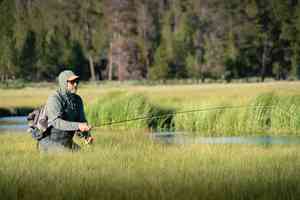
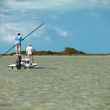

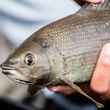
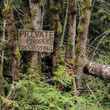
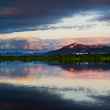
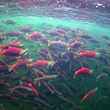
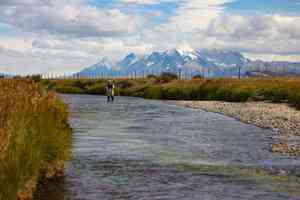

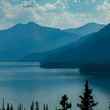
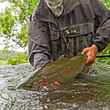
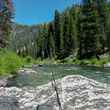
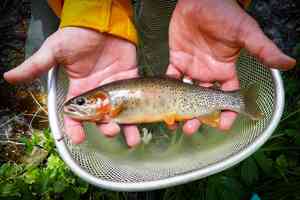
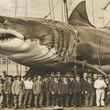

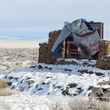
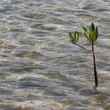



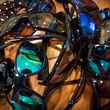
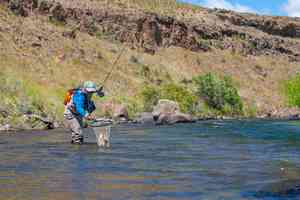

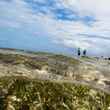
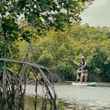
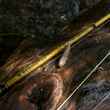
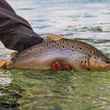
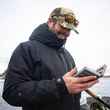
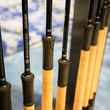
Comments